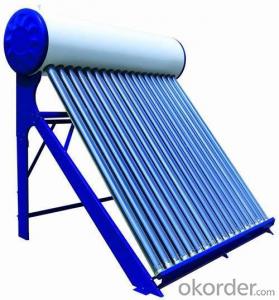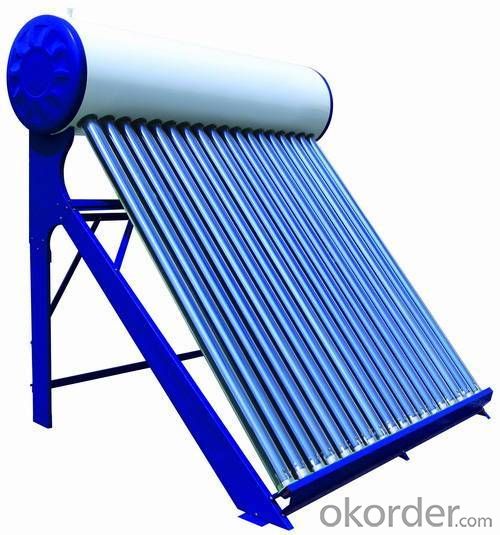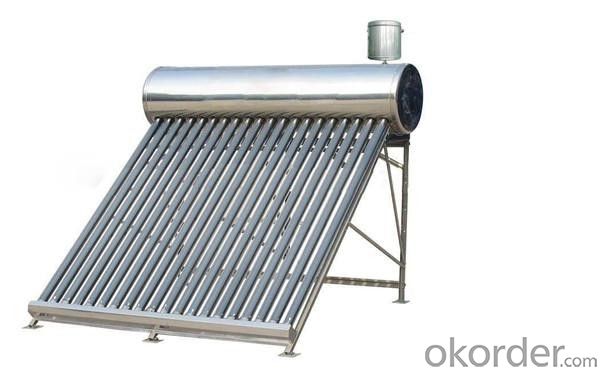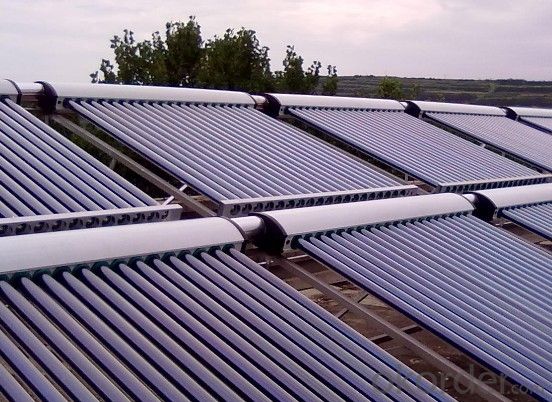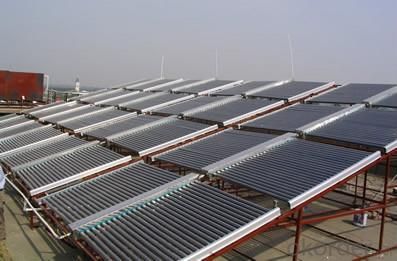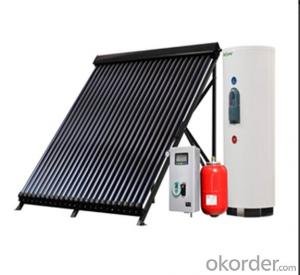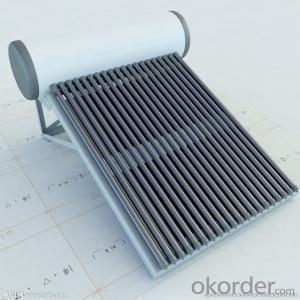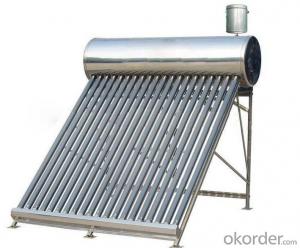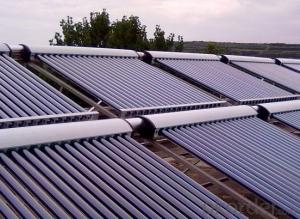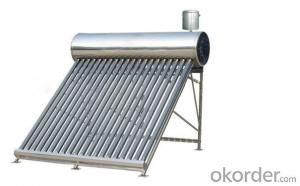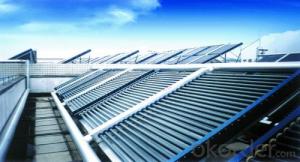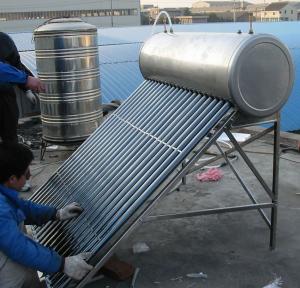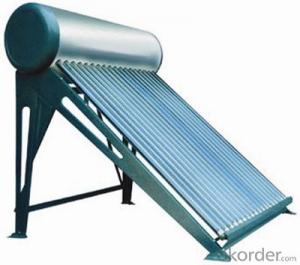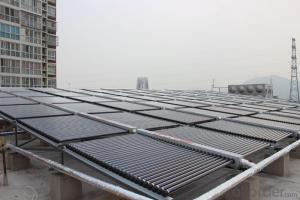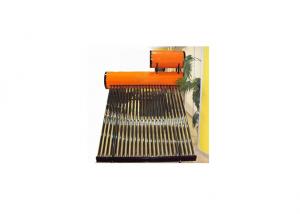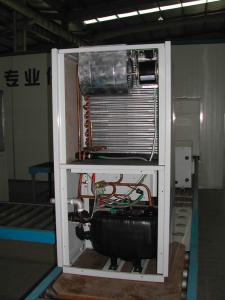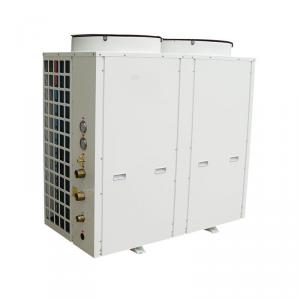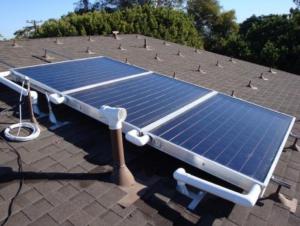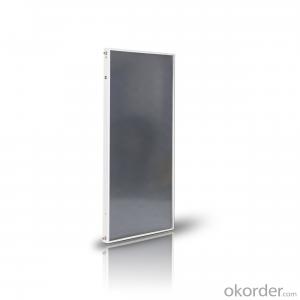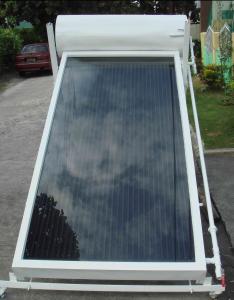Price of Color Steel Compact Non-Pressure Thermal Solar Water Heater
- Loading Port:
- China main port
- Payment Terms:
- TT OR LC
- Min Order Qty:
- 1 set
- Supply Capability:
- 6000 set/month
OKorder Service Pledge
OKorder Financial Service
You Might Also Like
Introduction of Non-Pressure Solar Water Heater:
Non-pressure Solar Heater is one of the most economical solar water heating device with pretty high efficiency at the same time. It consists of hot water storage tank, solar vacuum tubes with mouth plug in storage tank, and bracket supporting tank and tubes.When cold water in evacuated tubes is heated with solar irradiation, as the specific gravities of hot water and cold water are different, hotter water goes upward to storage tank and colder water goes downward to glass tubes. through this continuous circulation, the cold water in storage tank will be gradually heated till sunset.
Specialty:
1. High thermal performance and working temperature: the heat exchanging rate even in winter can up above 55%.
2. Heat collecting efficiency is at least 20% above common solar systems.
3. Work in all day and all season: no matter any corner of the world, this system can work well even -40℃ to avoid the tube freezing problem.
4. Reliability: No water following through the tube, so water scale can not generate and tube cracks could be avoided, the system still can keep working even with some damaged tubes.
5. It can connect with water tap and work automatically with pressure0.6Mpa, bring enjoyable washing experience.
6. Safety: P/T valve would release pressure and temperature to protect tank..
Technical Specification:
1. Outer tank material: SUS304 stainless steel or powder coated color steel
2. Inner tank material: 1.2mm thick SUS304 food grade stainless steel ( Optional material SUS316L)
3. Vacuum tube material: borosilicate glass 3.3; AL-SS-CU absorb coating, with copper heat pipe inside
4. Frame material: 1.2mm thickness stainless steel
5. Insulation material: 55mm thickness polyurethane
6. Suitable for mains pressure water(up to 8 bar/116psi)
7. Easy plug-in installation
8. Install the T/P valve on the pressurized tank
9. Seal material: Stabilized High Temperature Silicon
Outer tank material: SUS304 stainless steel or powder coated color steel
Inner tank material: 1.2mm thick SUS304 food grade stainless steel ( Optional material SUS316L)
Vacuum tube material: borosilicate glass 3.3; AL-SS-CU absorb coating, with copper heat pipe inside
Frame material: 1.2mm thickness stainless steel
Insulation material: 55mm thickness polyurethane
Suitable for mains pressure water(up to 8 bar/116psi)
Easy plug-in installation
Install the T/P valve on the pressurized tank
Seal material: Stabilized High Temperature Silicon
19. Vacuum Tube | 20. Size (mm) | 21. Φ47*1500 / Φ58*1800 / Φ70*2100 | |||||
22. Tube (pcs) | 23. 10 / 12 / 15 / 18 / 20 / 22 / 24 / 30 / 36 / 42 | ||||||
24. Material | 25. Borosilicate 3.3 glass, magnetron spluttering selective coating | ||||||
26. Coating | 27. Single-target AL-N/AL or Three-target AL/N-Cu-SS | ||||||
28. Water Tank | 29. Capacity | 30. 80L ~ 500L for hot water storage tank | |||||
31. Inner tank | 32. Food-grade stainless steel SUS304-2B / SUS316 | ||||||
33. Insulation | 34. High-density polyurethane foam with 70~80 hour heat preservation | ||||||
35. Tank shell | 36. Food-grade stainless steel SUS304-2B | ||||||
37. Bracket | 38. Shaped strong aluminum alloy structure adaptable for flat or slope roof | ||||||
39. Accessories | 40. Anti-aging silicon seals, Dustproof seals, Air-vent cap, Stainless screws | ||||||
41. Auxiliary Devices | 42. Assistant tank, Intelligent controller, Electrical heater, Magnesium anodes | ||||||
43. Tilt Angle | 44. 25 ~ 50° | ||||||
45. Water Output | 46. 45 - 95°C | ||||||
47. Hail Resistance | 48. Φ25mm diameter | ||||||
49. Model Number | 50. Solar Vacuum Tube | 51. Tank 52. Liter | 53. System 54. Liter | 55. Container Loading Qty /sets | |||
56. Size /mm | 57. Qty /pcs | 58. 20GP | 59. 40GP | 60. 40HQ | |||
61. VNS-58SA12-100 | 62. Φ58*1800 | 63. 12 | 64. 100 | 65. 132 | 66. 58 | 67. 119 | 68. 140 |
69. VNS-58SA15-130 | 70. 15 | 71. 130 | 72. 170 | 73. 54 | 74. 108 | 75. 131 | |
76. VNS-58SA18-150 | 77. 18 | 78. 150 | 79. 198 | 80. 43 | 81. 86 | 82. 105 | |
83. VNS-58SA20-170 | 84. 20 | 85. 170 | 86. 223 | 87. 40 | 88. 80 | 89. 97 | |
VNS-58SA24-200 | 24 | 200 | 263 | 35 | 70 | 85 | |
VNS-58SA30-250 | 30 | 250 | 329 | 28 | 56 | 68 | |
VNS-58SA36-300 | 36 | 300 | 395 | 23 | 47 | 57 | |
Products Show
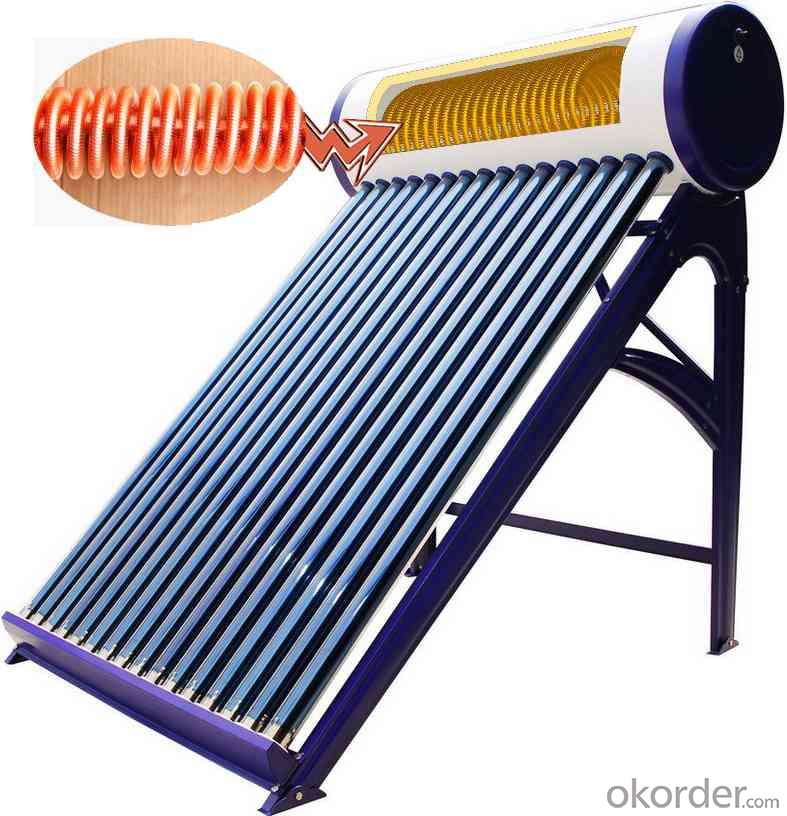
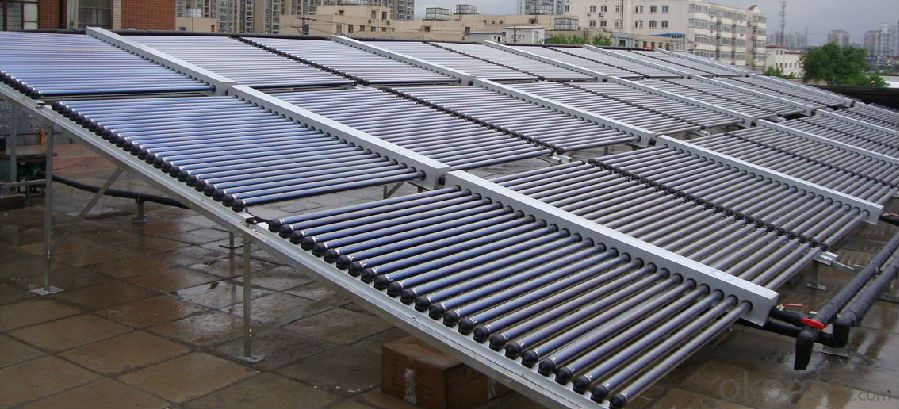
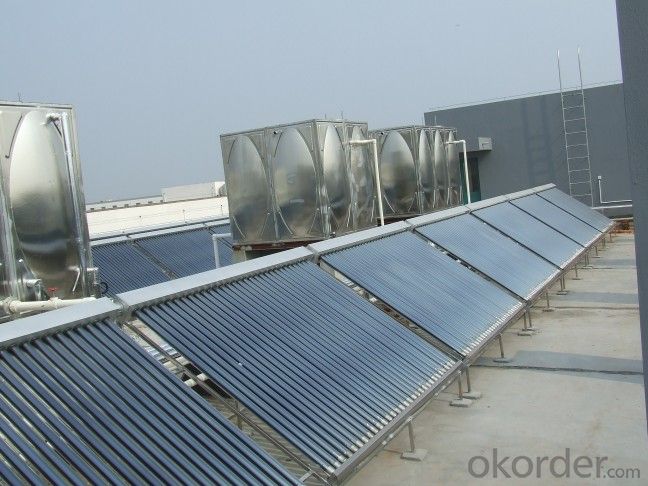
Our Services
1. OEM service
2. Warranty: 5 years
3. Considerable after sale service
Color steel Compact pressure Thermal solar heater
FAQ:
1. What’s the delivery time?
10 days after receiving deposit.
2. How long is the warranty?
5 years for whole system, 1 year for accessory
3. What’s your production capacity?
6000sets/month
4. What’s the MOQ?
1 set.
5. What’s your payment term?
Container: 30% T/T in advance for deposit, 70% T/T before shipment for fist order.
70% T/T after seeing copy of B/L from second order
Sample: 100% T/T in advance
Other choices: L/C at sight.
6. What certifications do you have?
CE, SOLAR KEYMARK, SRCC and etc.
- Q: Can a solar water heater be used in areas with high levels of water salinity?
- Yes, a solar water heater can be used in areas with high levels of water salinity. However, it is important to consider the impact of the salinity on the system's components and overall efficiency. High levels of water salinity can lead to scale buildup, corrosion, and reduced heat transfer efficiency. Proper maintenance, such as regular descaling and corrosion prevention measures, may be required to ensure optimal performance and longevity of the system in such areas.
- Q: Can a solar water heater be used in areas prone to hurricanes or typhoons?
- Yes, a solar water heater can be used in areas prone to hurricanes or typhoons. However, it is crucial to ensure that the system is properly designed, installed, and anchored to withstand extreme weather conditions. Reinforcements and protective measures may be required to secure the solar water heater and prevent damage during severe storms.
- Q: Solar water heater is good
- Whether in winter or in other seasons, the power consumption is mainly two parts: electronic water pump, power consumption is very small; the two is electric complementary heating on sunny days, you don't need to need additional heating, continuous cloudy, power is generally about 1500W. In general, the use of solar water heaters is still very cost-effective, before the light bath a month of gas, according to the current price of more than and 90, the nearest thousand yuan a year!
- Q: What is the average lifespan of the storage tank in a solar water heater?
- The lifespan of a storage tank in a solar water heater may differ due to factors like tank quality, materials used, maintenance, and climate conditions. Nonetheless, a well-maintained and correctly installed tank in a solar water heater typically lasts between 10 to 20 years. To extend the tank's lifespan and guarantee optimal performance, regular inspections, cleaning, and maintenance are crucial. Additionally, it is essential to take into account the manufacturer's warranty and specifications, as they may provide specific lifespan information for certain tanks.
- Q: Can a solar water heater be used in areas with limited water supply?
- Yes, a solar water heater can be used in areas with limited water supply. Solar water heaters use the energy from the sun to heat water, and they do not require a continuous flow of water to function. They can be designed with storage tanks, allowing water to be heated during periods of water availability and used when needed, making them suitable for areas with limited water supply.
- Q: Can a solar water heater be used in areas with limited access to a backup system?
- Yes, a solar water heater can be used in areas with limited access to a backup system. Solar water heaters rely on the sun's energy to heat water, so as long as there is sufficient sunlight, the system can function without the need for a backup system. This makes it a suitable and sustainable option for areas with limited access to backup systems or unreliable grid electricity.
- Q: How much energy can a solar water heater save?
- A solar water heater can save a significant amount of energy, typically reducing energy consumption for heating water by 50% to 80% compared to traditional water heaters.
- Q: Can a solar water heater be used to generate electricity?
- No, a solar water heater cannot be used to generate electricity. Its primary function is to use solar energy to heat water for domestic or commercial use, not to generate electrical power.
- Q: Can a solar water heater be used in areas with limited access to skilled technicians?
- Yes, a solar water heater can be used in areas with limited access to skilled technicians. Solar water heaters are relatively simple and straightforward systems that can be installed and maintained with basic technical knowledge. They do not require complex equipment or advanced skills for operation. Additionally, manufacturers often provide detailed installation instructions and customer support, making it easier for individuals in remote or underserved areas to set up and maintain solar water heaters independently.
- Q: Can a solar water heater be used in areas with limited access to financing options or loans for renewable energy projects?
- Certainly, areas with limited access to financing options or loans for renewable energy projects can make use of solar water heaters. One major advantage of these heaters is their affordability and quick payback period, making them an attractive option for those with limited financial resources. Solar water heaters are simple and low-cost technologies that are easy to install and maintain. They do not require expensive infrastructure or complex financing arrangements. In fact, there are many DIY solar water heater designs available, allowing individuals to build and install their own systems using materials found locally. In developing countries where access to financing options for renewable energy projects is limited, solar water heaters have been widely adopted. Governments, non-profit organizations, and international development agencies often provide subsidies, grants, or technical assistance to support the installation of these heaters. These initiatives aim to reduce reliance on fossil fuels, address energy poverty, and provide affordable and sustainable hot water solutions. Furthermore, solar water heaters can significantly reduce energy costs in the long run as they utilize free and abundant solar energy to heat water. This makes them a cost-effective alternative to traditional water heating methods like electric or gas-powered heaters. By reducing energy expenses, individuals or communities can allocate their limited financial resources to other urgent needs or invest in other sustainable development projects. To conclude, solar water heaters can be an ideal solution for areas with limited access to financing options or loans for renewable energy projects. Their affordability, simplicity, and potential for cost savings make them accessible and practical even in resource-constrained settings. Additionally, governmental and non-governmental initiatives often exist to support the adoption of solar water heaters in these areas, further facilitating their implementation and promoting sustainable energy practices.
Send your message to us
Price of Color Steel Compact Non-Pressure Thermal Solar Water Heater
- Loading Port:
- China main port
- Payment Terms:
- TT OR LC
- Min Order Qty:
- 1 set
- Supply Capability:
- 6000 set/month
OKorder Service Pledge
OKorder Financial Service
Similar products
Hot products
Hot Searches
Related keywords
